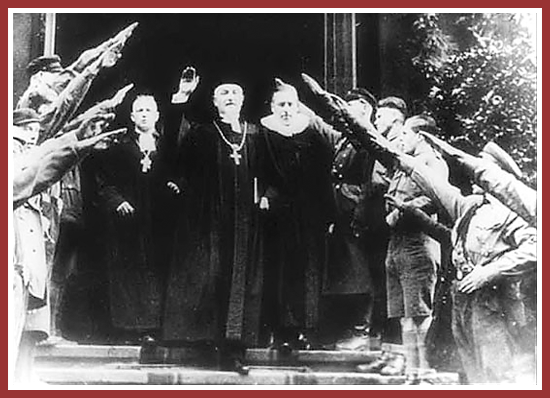How was it possible that so many Christians not only didn’t oppose the evil of the Nazi regime but even openly supported it? Why was their faith so defective in the face of something so obviously at odds with the teaching and example of Jesus? The answer is obviously very complex and mult-faceted one but one aspect that should be conisdered is how we understand the term ‘faith’. The word ‘faith’ or ‘belief’ is one of those words that gets used so frequently and so easily within Christian circles that we often just assume that we know what we mean when we do use it. But what exactly is faith and what does it mean to have faith?

If you know your Bible you will probably go straight to Hebrews 11 where faith is defined as being ‘the assurance of things hoped for and the conviction of things unseen’. This is helpful on some level, but it still leaves many questions unanswered. I suggest that there are at least three different elements within the concept of faith, which are belief, trust, and allegiance, but here I want to just focus on the last one, the idea of faith as allegiance.
In his letter to the church in Rome, Paul twice uses the interesting phrase ‘the obedience of faith’ (1:5, 16:26) and on both occassions it is within the context of him discussing the gospel (1:1-5, 16:25-26). This gospel, which was promised through ancient prophecies, is about Jesus, descended from the royal line of David, who is the Son of God, Messiah, and Lord and the proper response to this gospel, according to Paul, is the obedience of faith. If the gospel is about the kingship and Lordship of Christ and if faith contains aspects of allegiance or faithfulness then the idea of obedience as a response makes total sense. As Matthew Bates says, ‘the gospel is that Jesus has been enthroned, so that the only proper response is obedient allegiance to him as the king’.[1]
The Holy people will be those who have been set apart for Christ’s service. they are the people different from those around them, different because they have given their ultimate allegiance to God through Jesus as Lord’
Darrell Guder
Michael Gorman, who has spent decades studying Paul’s understanding of the gospel says that the biblical word for faith ‘is difficult to render into English especially with one word’ and that ‘a phrase like “believing allegiance”, “faithful allegiance”, or “trusting loyalty” comes close to conveying its core meaning in many instances’.[2]
This radical pledge of allegiance to God often put the Christians at odds with the wider world around them that sought to seduce, persuade, manipulate, or if that didn’t work, force them, to give their allegiance to other gods and other lords. During a time of persecution in 250 AD, the Roman Emperor Decius tried to bring unity and strength to the Empire by getting everyone to worship and acknowledge the same pagan gods. People were asked to make sacrifices to these gods in the presence of a Roman official and if they did so they were given a signed document that they had complied and those that refused suffered severe consequences, even death. Whilst this decree was not specifically aimed at persecuting Christians, it was clear that they would be disproportionately affected by it as they were bound in loyalty and allegiance to one God, one Lord, and one Spirit.
This brings us back to the start of the blog and questions about the church during the second world war. For it was at this time that Hitler appointed a man by the name of Hans Kerrl to the position of ‘Minister for Ecclesiastical Affairs’ for the Nazi Party and it was his job to try and get Christian churches on board with their agenda. In a telling document, Hans Kerrl describes how Church leaders had tried to convince him about the nature of Christianity and he said ‘that makes me laugh … no, Christianity is not dependent upon the apostles Creed … true Christianity is represented by the party, and the German people are now called by the party and especially by the fuhrer to a real Christianity … the fuhrer is the Herald of a new revelation’. The Nazi’s then went on to try and convince German pastors and Christians to believe in this ‘real Christianity, this ‘new revelation’, by asking them to swear an oath of allegiance to Hitler.
I have always been struck by the disproportionately high incidence of piety among those who did resist the Nazi’s. One had not much known or noticed such people before. But now, when resistance was what one looked for, often in vain, it was such people that seemed to have it and to offer it.
Ruhm Van Oppen
We may not have Emperors or Fuhrers threatening us with persecution or death if we don’t’ swear an oath of allegiance to them but there are many other powers, many other authorities, many other spirits at work in the world that would seek to make us compromise our allegiance to Jesus. Where do you see these at work in our midst and what difference might to how we engage with them if we understood ‘faith’ as about loyalty and the Apostles’ Creed as a pledge of allegiance?
As always, we would love to hear any thoughts, reflections, questions, or feedback you might have about this, so please do take a moment and leave a comment below!
[1] Matthew W. Bates, Salvation by Allegiance Alone: Rethinking Faith, Works, and the Gospel of Jesus the King, 2017, 86.
[2] Michael J Gorman and Wm. B. Eerdmans Publishing Co, Becoming the Gospel: Paul, Participation, and Mission (Grand Rapids; Cambridge: William B. Eerdmans Publishing Company, 2015), 90–91.
To hear more about the above, have a watch of the video below.

